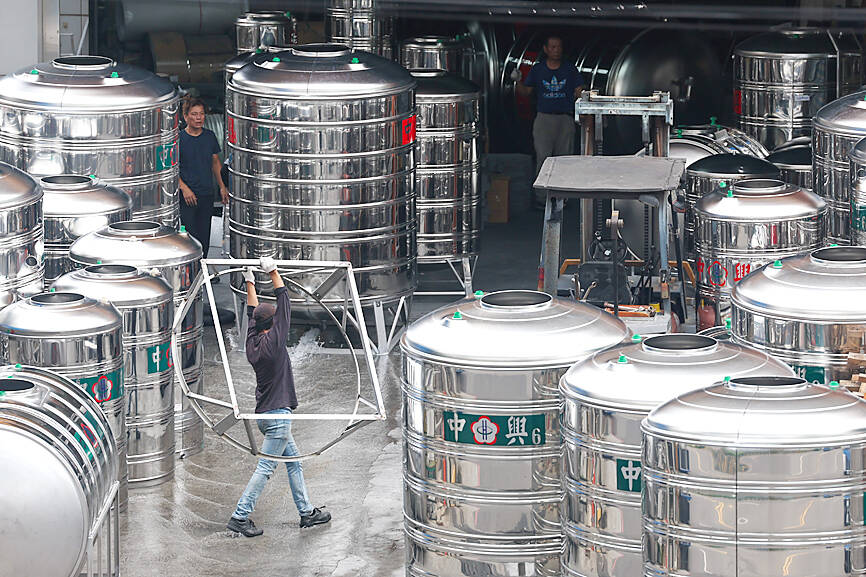Taiwan’s official manufacturing purchasing managers’ index (PMI) was 53.7 last month, marking a second consecutive month of expansion, although it slowed from 55.4 a month earlier, the Chung-Hua Institution for Economic Research (CIER, 中華經濟研究院) said yesterday.
The index, which seeks to gauge the health of the nation’s manufacturing industry, remained in robust territory, despite a mild slowdown that had to do with lingering concerns about geopolitical tensions and production cost increases, CIER acting chairman Wang Jiann-chyuan (王健全) told a news conference in Taipei.
PMI values of 50 or higher indicate expansion and figures below the threshold suggest contraction.

Photo: CNA
“Short and rush orders continued to prevail,” reflecting the cautious approach of customers at home and abroad in dealing with uncertainty, Wang said, citing a monthly survey of local firms.
The sub-index on inventory rose an insignificant 0.2 points to 49.4, while clients’ inventory rose 1 point to 43.1, although almost all sectors reported an increase in business, except for transportation tool makers, as they took a hit from US tax hikes on imported vehicles from China, CIER said.
Heightened US-China trade tensions prompted automakers in China to become more conservative about inventory buildup, which was unfavorable for Taiwanese suppliers of vehicle parts, Wang said.
Artificial intelligence (AI) remained the main growth driver, bolstering the readings on new business orders and industrial output to 59.2 and 56.4 respectively, although both dropped 4.6 points from a month earlier, the survey showed.
Semiconductor firms fared better than electronics makers and the trend would continue until the AI boom spreads from data centers and cloud services to downstream technology products, such as smartphones and personal computers, Wang said.
At the same time, the reading on employment gained 0.9 points to 51.2, indicating that firms largely relied on improving efficiency to meet business needs, rather than hiring new workers, the survey said.
The gauge on raw material prices declined 5.6 points to 60.5, remaining at a high level that would cause profit erosion, Wang said.
However, all manufacturing sectors remained positive about their business prospects due to the arrival of the high sales season, as the six-month outlook measure was 59.2, although it declined from 60.1 in May, the survey showed.
The non-manufacturing sector’s business gauge rose 4.4 points to 58.6, expanding for 20 months, thanks in part to TAIEX rallies that led investors to enjoy wealth gains, Wang said, adding that financial service providers were the biggest beneficiary.
That euphoria might extend into the summer, when overseas and domestic tourism companies embrace their peak season, Wang said.
That explained why the reading on the six-month outlook remained elevated at 61.5, with all sectors expecting business gains ahead, the survey showed.

AI BOOST: Although Taiwan’s reliance on Chinese rare earth elements is limited, it could face indirect impacts from supply issues and price volatility, an economist said DBS Bank Ltd (星展銀行) has sharply raised its forecast for Taiwan’s economic growth this year to 5.6 percent, citing stronger-than-expected exports and investment linked to artificial intelligence (AI), as it said that the current momentum could peak soon. The acceleration of the global AI race has fueled a surge in Taiwan’s AI-related capital spending and exports of information and communications technology (ICT) products, which have been key drivers of growth this year. “We have revised our GDP forecast for Taiwan upward to 5.6 percent from 4 percent, an upgrade that mainly reflects stronger-than-expected AI-related exports and investment in the third

Mercuries Life Insurance Co (三商美邦人壽) shares surged to a seven-month high this week after local media reported that E.Sun Financial Holding Co (玉山金控) had outbid CTBC Financial Holding Co (中信金控) in the financially strained insurer’s ongoing sale process. Shares of the mid-sized life insurer climbed 5.8 percent this week to NT$6.72, extending a nearly 18 percent rally over the past month, as investors bet on the likelihood of an impending takeover. The final round of bidding closed on Thursday, marking a critical step in the 32-year-old insurer’s search for a buyer after years of struggling to meet capital adequacy requirements. Local media reports

TECHNOLOGICAL RIVALRY: The artificial intelligence chip competition among multiple players would likely intensify over the next two years, a Quanta official said Quanta Computer Inc (廣達), which makes servers and laptops on a contract basis, yesterday said its shipments of artificial intelligence (AI) servers powered by Nvidia Corp’s GB300 chips have increased steadily since last month, should surpass those of the GB200 models this quarter. The production of GB300 servers has gone much more smoothly than that of the GB200, with shipments projected to increase sharply next month, Quanta executive vice president Mike Yang (楊麒令) said on the sidelines of a technology forum in Taipei. While orders for GB200 servers gradually decrease, the production transition between the two server models has been

ASE Technology Holding Co (日月光投控), the world’s largest integrated circuit (IC) packaging and testing supplier, yesterday announced a strategic collaboration with Analog Devices Inc (ADI), coupled with the signing of a binding memorandum of understanding. Under the agreement, ASE intends to purchase 100 percent shares of Analog Devices Sdn Bhd and acquire its manufacturing facility in Penang, Malaysia, a press release showed. The ADI Penang facility is located in the prime industrial hub of Bayan Lepas, with an area of over 680,000 square feet, it said. In addition, the two sides intend to enter into a long-term supply agreement for ASE to